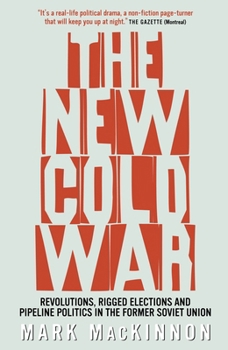The New Cold War: Revolutions, Rigged Elections and Pipeline Politics in the Former Soviet Union
Select Format
Select Condition 
Book Overview
An intrepid investigation into the pro-democracy movements that have reshaped the Eastern bloc since 2000, reopening the Kremlin's wounds from the Cold War. When the Berlin Wall fell in 1989 and the Soviet Union collapsed two years later, liberal democracy was supposed to fill the void left by Soviet communism. Poland and Czechoslovakia made the best of reforms, but the citizens of the "Evil Empire" itself saw little of the promised freedom, and more of the same old despots and corruption. A a second wave of reforms-Serbia in 2000, Georgia in 2003 and Ukraine in 2004, as well as Kyrgyzstan's regime change in 2005 - have proven almost as monumental as those in Berlin and Moscow. The people of the Eastern bloc, aided in no small part by Western money and advice, are again rising up and demanding an end to autocracy. And once more, the Kremlin is battling the White House every step of the way. Mark MacKinnon spent these years working in Moscow, and his view of the story and access to those involved remains unparalleled. With The New Cold War, he reveals the links between these democratic revolutions - and the idealistic American billionaire behind them-in a major investigation into the forces that are quietly reshaping the post-Soviet world.
Format:Paperback
Language:English
ISBN:0679314474
ISBN13:9780679314479
Release Date:February 2008
Publisher:Vintage Books Canada
Length:336 Pages
Weight:0.70 lbs.
Dimensions:0.9" x 5.2" x 8.0"
Customer Reviews
1 rating
Foreign Invasion by the Ballotbox
Published by Thriftbooks.com User , 16 years ago
It could only have been written by a Canadian! No mainstream Brit or American journalist would hold up the dirty underwear of the East European "democratic transition" in broad daylight - if only because so many of the stains orginated in London and Washington. Mark MacKinnon has done an excellent investigative job in portraying the packaged "democracy" of the color-coded pseudo-revolutions that swept through the former Soviet bloc (and, later, targeted other sites from Lebanon to Venezuela) within the last decade: how they were spawned in "think tanks" funded by Western governments, and their agendas formulated to serve strategic Western agendas. Ironically, MacKinnon sees no difference between this subsidized subversion and the Putin-style "managed democracies" they target. And of course he's right. Promoting "democratic revolution" has become the surrogate for direct armed invasion - though, as in Iraq, both can work well together. The strategies these ersatz movements pursue are no different from Communist Popular Front tactics in the same region after World War Two - in fact, the Ukraine's "Orange Revolution" resembles nothing so much as the Czechoslovak "Communist coup" of 1948: a great betrayal of democracy when committed by Them, a flowering of the democratic spirit when choreographed by Us. Of course there is real frustration and disappointment in the targeted nations, and the revolutionaries of color can find fertile fields for sowing. But the end result does not serve the people whose anger has been manipulated, but invariably the economic and "security" interests of major Western powers, principally but not exclusively the United States. The danger of raising false hopes in these client regimes has been all too plainly illustrated in the case of Georgia, whose US-installed president launched an armed quarrel with Russia banking on the broad American support he'd grown used to, hoping to force his country's inclusion into NATO. When the US didn't "come through" pro-US feeling quickly turned sour, the disillusioned backlash inevitable after starry-eyed adolescent puppy-love meets the real world. Beyond doubt more such knee-jerk little wars and subsequent bad feeling await other "successful" color-coded regimes described in MacKinnon's book.





